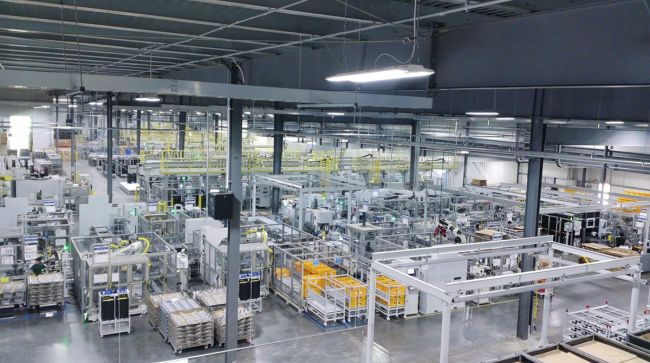A drone view of the plant’s interior. (Shinhwa)
MONTGOMERY, Ala. — An auto parts supplier plans a $114 million investment to expand its facility in Alabama to support the production of electric vehicle parts, Gov. Kay Ivey’s office announced Aug. 15.
Shinhwa Auto USA Corp.’s expansion will create 50 jobs over the next three years and add a 170,000-square-foot production building on the company’s site in Auburn Technology Park West, officials said. The average salary of workers at the plant will be about $48,000, the Alabama Department of Commerce said.
“Shinhwa’s constant growth in Auburn demonstrates Alabama, through high levels of innovation and technical prowess, is preparing for an evolving future,” Ivey said in a news release.
“Shinhwa’s story here in Auburn is evidence of the work generations of leaders have done to make our community not only welcoming to but also fertile ground for businesses,” Auburn Mayor Ron Anders said. “We’re grateful for Shinhwa’s investment in Auburn and look forward to seeing them continue to thrive.”
Shinhwa Auto USA Corp. is expanding its manufacturing operation in @CityofAuburnAL to support the production of electric vehicle parts.
Made in Alabama is committed to bringing back Made in America! #alpoliticshttps://t.co/Y1GtE5ilbA
— Governor Kay Ivey (@GovernorKayIvey) August 15, 2023
With this new investment project, Shinhwa plans to increase capacity by expanding die-casting operations and adding associated processes that are required to make control arm, knuckle, carrier and motor housing covers in support of Hyundai, Kia and other automakers in the U.S., the news release said.
“As one of the most innovative industrial manufacturers of aluminum car components, we are confident that the momentum we have achieved will continue to meet customers’ growing demand for high-quality products,” said Kwi Hyun Lee, chairman of Shinhwa Group.
The expansion will be the South Korean company’s third since choosing Auburn as the site of its first U.S. plant in 2019. The company did not immediately say when the project would begin or was expected to be completed.






